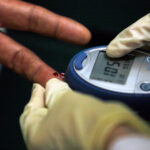To understand Mpumalanga’s teen pregnancies, look closely at the much older men calling the shots.
The midday sun beats down heavily on a dirt road in Tonga, a rural town near the Komati River in Mpumalanga. A truck speeds past and engulfs the two young women walking down the road in dust.
Ntombi* (21) and her friend are walking towards the bushy end of the street. They are on their way home from the array of shops spread along the main road, where they were submitting their CVs in an attempt to get a casual job.
“There isn’t much to do here in Tonga. The few of us who do manage to get jobs never keep them for long,” says Ntombi. “It’s really tough because we both have children to look after.”
Ntombi fell pregnant when she was 17 when she was in grade 11. She left school for only three months and then returned to finish grades 11 and 12. But having a child, she says, made it impossible for her to study further after completing matric.
“My parents passed away when I was small so I lived with my sister. They [her parents] didn’t know I was dating; they weren’t there to see me sneaking out at night. They weren’t there to advise me to go to the clinic [to get contraceptives] and not to have sex. So that’s how I ended up pregnant,” she says with a shrug.
Teen pregnancy a “symptom of bigger problems”
Nhlanhla Shungube, a paralegal at Masisukumeni Women’s Crisis Centre, an organisation working with abused women in the area, says there are many young women who are in a situation similar to Ntombi’s. She says teenage pregnancy is often a symptom of bigger problems in the Nkomazi district, where Tonga is situated.
“There are families here who live in extreme poverty. We have a lot of orphans in the area because their parents are dead or working in the city and they live on their own. It makes them very vulnerable to sexual exploitation. They use what they have to get an income – and often all they have to offer is their bodies.”
The prospect of receiving government child support grants of R290 a month has often been cited as a reason why teenagers fall pregnant. A 2012 study by the department of social development, however, found that this is far from the truth. The study showed that adolescents who received child support grants had fewer sexual partners, less sex, used alcohol and drugs less frequently and fell pregnant less often than those without the grants.
Shungube says the grants are a lifeline for families who have nothing, but it is not enough of an incentive for girls to deliberately fall pregnant.
“People who blame the child support grant are usually those who do not have children. Anybody who has a child knows that R290 a month is not nearly enough to sustain a child,” says Shungube.
Without the support of her 22-year-old boyfriend, Ntombi says she would not be able to provide for her daughter.
“The grant is not much help – because it is so little it does nothing. A child is expensive. R290 is not money nowadays. Pampers [nappies] alone cost more than R100 a pack. You still have to buy clothes and soap, and the child still has to eat,” she says, shaking her head.
Ntombi says that girls who have children so that they can access child support grants soon realise that the money does not translate into spending money – “it’s not even enough to feed a child”.
“So they end up having more children in order to increase the grant payout without realising that the needs of the children increase as you have more,” she says.
More and more girls falling pregnant
According to the government’s National Strategic Plan on HIV and sexually transmitted infections, 39% of girls between the ages of 15 and 19 in South Africa have been pregnant at least once. Almost half of the teenage mothers fall pregnant again within two years of giving birth, the report shows.
Earlier this year, Mpumalanga education MEC Reginah Mhaule announced that more than 1 500 girls in schools around the province fell pregnant in the first half of 2013, close to the same number – 1 602 – recorded in 2012. But 2012 figures from Tonga District Hospital show that 1 216 teenagers gave birth at this hospital alone – well above the number provided by the MEC.
This could be because Mhaule’s estimate is based on teenagers attending school, whereas the hospital counted all births by teenagers.
Sugar daddies a big part of the problem
David Mahlalela leans against the wall outside the dining hall at Far East Country Guest House in Tonga, where he works as a security guard.
In his line of work, he says, he sees a lot of teenagers being taken advantage of.
“Just last week I bumped into two young girls. You can see they are still schoolchildren, but they were both pregnant and the men who impregnated them were denying it,” he says.
“Most of these girls are in a desperate situation and some men take advantage of that and make promises they don’t intend to keep.”
Mahlalela says that because there is so much poverty in the area it does not cost a lot to impress the girls as they see men who have jobs as a chance at a better life.
“The law must be strict when it comes to schoolchildren and pregnancy,” he says. “An adult who impregnates a child must be punished – even if they are in a relationship. What is a 30-year-old thinking impregnating a schoolchild?”
According to a 2009 education department study, most research on early parenthood “focuses on young women, shedding little light on the men who have impregnated them and rendering them as invisible or absent”. The study states that the fathers of babies born to teenage girls are on average at least eight years older than the mother – fewer than 2% of men in Southern Africa report early or teenage fatherhood.
In cases where teenage boys do become fathers, poor educational performance has been identified as a powerful predictor of young fatherhood, according to the study.
A Human Sciences Research Council survey on the status of youth has shown that, “as with young women, premature exit from the schooling system almost doubled the odds of young men fathering a child early on”.
Due to multiple sexual partnerships, teenage boys were often uncertain about whether they were the father of the child. Moreover, they expressed “a fear of being stigmatised by the teen mothers’ family due to their inability to provide financial support to the child”.
The Mail & Guardian could not find a school boy in Tonga who was willing to talk to us about sex or teenage pregnancy.
Schoolgirls talk to the M&G about sex
Down the road from the guest house, Tonga Mall is bustling with school children in mismatched uniforms. Three girls aged 13, 15 and 17 are among the teenagers sitting at one of the fast-food restaurants that are scattered around the entrance to the mall.
They erupt into a fit of shy giggles.
“I do have a boyfriend,” the 15-year-old confesses, despite the teasing looks from her friends. She and her 17-year-old boyfriend have been dating for two years.
“No, no, no I don’t do that [have sex],” she laughs shyly at the question of whether or not she and her boyfriend use condoms. “I’m still too young. There are some girls whose boyfriends are rough and they demand it [sex],” she says. “In that case I don’t see how they [girls] can ask if they can use condoms.”
The giggling comes to an abrupt stop at the thought of telling her parents about her boyfriend. “Ha,” she and her friends exclaim incredulously. “Maybe when she’s older, like 21,” says one.
The girls say they do not speak to their parents about sex because they are scared of being scolded.
“I’ve never spoken to my mother about sex. I’m scared,” the 13-year-old says. “Some mothers will ask if you want to do it [have sex]. You’ll even be shocked because you were just asking. She will ask why you want to know about sex and you will have to give her a reason for your questions.”
According to the girls, speaking to their parents about sex would help them to make informed decisions. This, they say, would be more effective than school sex education because children attach more value to their parents’ opinions than those of their teachers.
“If you know [about sex], it won’t be easy for you to do it because you’ll know that this thing [sex] has its advantages and disadvantages,” says the 15-year-old.
But, they say, some of their peers still fall pregnant despite the lessons they are taught at school.
“In my opinion, teenage pregnancy is a problem and it has become common for people to get pregnant at a young age,” the 13-year-old says. “Some do it by mistake, others get raped and others just do it because they want to.”
Contraceptives for pregnancy and HIV
A study by the department of education revealed that although knowledge of contraception was good, 66% of pregnant teenagers reported that they did not use any method of contraception.
The government’s latest antenatal survey showed that 36.7% of pregnant women in Mpumalanga who attended public health facilities were HIV positive. This is higher than the national average of 29.5%. Nearly four out of 10 pregnant women in Ehlanzeni district, where Tonga is situated, are HIV positive, according to the survey.
The health department’s national HIV plan states that women between the ages of 15 and 24 are four times more likely to have HIV than their male counterparts, and poorer women and orphans are the most vulnerable. The plan says that HIV infection rates in rural areas are “increasing rapidly”.
Standing in the scant shade of a tree on the side of the dirt road, Ntombi and her friend face their reality with empty smiles and a shrug.
“Young people do not want to understand that they have to protect themselves from Aids. On the 15th of every month just go to Mabuza [a tavern], you’ll find them there, drinking and busy with old men,” she says.
“There’s nothing I can advise them on because even if I can say ‘go get the injection [contraceptive]’ there is still Aids. No one can prevent that because when they’re drunk they don’t use condoms.”
*not her real name
See “Don’t rely on courts: fix the policy”
___________________________________________________________________________________
Poverty and powerlessness make rural girls vulnerable to rape
“Rape is a major contributor to teenage pregnancy in the area,” says Thandi Sibiya, a counsellor at Thuthuzela Care Centre in Mpumalanga, which provides support to rape victims. She is based at Tonga Hospital in the province’s Ehlanzeni district and deals with as many as four rape cases a day.
Sibiya says the prevalence of rape in her community is high because of the large number of vulnerable people. “We have a lot of orphans; there are a lot of young single mothers who have to keep a large home and have a lot of children, so that makes them targets in the community and some will try to take advantage.”
Rape can take different forms, says Sibiya. For example, girls from poor families often receive money and gifts from the person raping them and will therefore remain silent. “Or if a relative is threatening the girl to stop her from reporting the case, then it continues until she falls pregnant,” she says. “That’s rape.”
“Sometimes there are delays in reporting rape and by the time the girl gets to us, she is pregnant. The law says you can terminate a pregnancy, but there aren’t many places that provide those services in this area. So we’d have to refer them to Shongwe Hospital, which is almost 40km away from Tonga. Travelling there is expensive,” she says.
Furthermore, the abortion is seldom carried out the same day. The teenager is usually given a date to return to the hospital for the procedure. “So if she doesn’t have money to get there, she will end up not going and then having the baby,” says Sibiya.
According to a study on teenage pregnancy by the basic education department, rural provinces reported the highest number of teenage pregnancies between 2004 and 2008. The statistic for the Eastern Cape was 68 pregnancies per 1?000 pupils, with a figure of 62 in KwaZulu-Natal, 60 in Limpopo, 59 in the Northern Cape, and 55 in Mpumalanga and North West.
The study found that teenage pregnancy is more prevalent in schools in poor areas because there are higher levels of unemployment and education levels are low.
Power imbalances in relationships, with men deciding the terms of sexual relations, place young women at a higher risk of unplanned pregnancy, the report found. A total of 72% of the pregnant teenagers who took part in the study claimed that they were pressured into having sex and 11% reported that they were raped. Three out of five pregnant teenagers said they had been beaten by their boyfriends.
Sibiya says that girls who have been raped are at great risk of contracting HIV and other sexually transmitted infections. – Additional reporting by Sydney Masinga
Ina Skosana was a health reporter at Bhekisisa.





